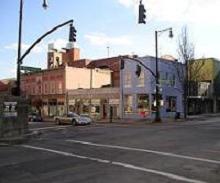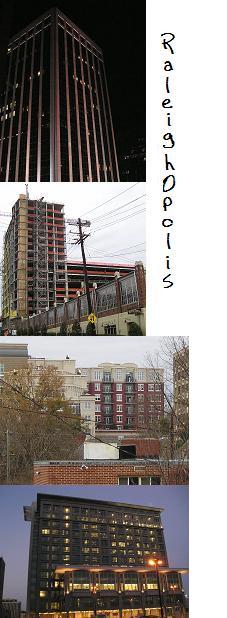|
Mean annual temperature
|
60.9°F
|
|
Hottest month
|
July (69.2°F- 89.2°F)
|
|
Coldest month
|
January (27.9°F- 48.1°F)
|
|
Average annual snowfall
|
7.9 in.
|
|
Mean annual rainfall
|
47.21 in.
|
|
Wettest month
|
August (9.26 in.)
|
|
Driest month
|
January (1.23 in.)
|
|
Average relative humidity
|
71%
|
|
Growing season
|
216 days
|
|
USDA Growth Zone
|
Most of the area is Zone 7.
|
|
Hurricanes
|
Due to Raleigh's location inland just above the coastal plain, although hurricanes do sometimes reach the Raleigh area,
they are usually depleted in strength. As a result, most Tropical Weather is in the form of heavy rain and strong but
not severe winds. Flooding is the most prominent concern. However, there are exceptions. Recent examples include
Fran (1995) which knocked down countless trees in Raleigh and Floyd (1997) which flooded some areas although
not as severely as down east.
|
|
Tornadoes
|
Raleigh is within the peculiar Mid-Atlantic area, that is occassionally prone to tornadic events, but which are generally
limited in strength and frequency. Aside from during tropical events, an occassional twister may set down in the Raleigh
area. These storms are generally of the F0-F2 variety with limited damage. Again there are exceptions. The infamous North
Raleigh twister annihilated a K-Mart on Glenwood Avenue and caused some casualties.
|
|
Snowstorms
|
The yearly snowfall totals for Raleigh are a bit misleading. In reality, it is pretty common for Raleigh to have
entire years with no significant snow event. Every couple of years a serious groundcover does fall. Due to the large
amounts of roads and limited removal equipment, these events tend to grind activity to a halt. Large portions of the
population skip work and dust off their sleds. On rare occassion, a heavy snowfall will occur under perfect conditions.
One recent event dropped 20" on the city.
|
|
Icestorms
|
Unfortunately these are not that rare an event in the Triangle. Due to location, Raleigh is often on the border
between snow and ice precipitation zones. Freezing rain can result in an incredibly beautiful area, where everything
looks carved out of crystal. The down sides though are that tree branches cannot easily hold half an inch of ice
resulting in downed power lines and unfamiliar drivers combine with untreated roads to create high accident rates.
|
|
Earthquakes
|
Although not technically a weather events, earthquakes are also addressed. Raleigh is not in a known seismic activity
area. There is no history of significant earthquakes in Raleigh. Still the outlying impacts of earthquakes have occassionally
been felt historically. The North Carolina mountains are moderately active, usually with small quakes. The area around
Charleston, SC is not highly active, but history records a very major earthquake when the city was still young.
|
|
Thunderstorms
|
During the summer months thunderstorms are common, although not a daily regimen like furthur south.
These storms can be very strong and may include hail and microbursts. Surge protectors are recommended.
|


